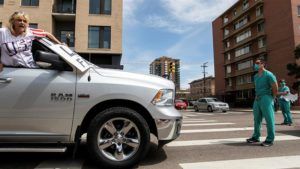
The Noun Murderers
Are medical personnel heroes?
When our culture went gaga over the first responders (gender-neutral term . . . can't use "firemen") after 9/11, I went gaga too. Actually, I would start to cry a bit, thinking of all those young men charging up the towers, knowing there was a good chance they would collapse, which they did.
And then we started referring to every soldier in Afghanistan as a "hero." That made me squirm a bit. Traditionally, soldiers become heroes while in the line of duty. That, anyway, is what the war movies taught me. A soldier became a hero by ripping off his gear, running across no-man's land with enemy bullets flying around him, retrieving wounded Ace the Army Dog, and running back to the trench.
The dude who hung back, watching it unfold, maybe shooting vigorously at the enemy in order to distract them from the man who was running across the field?
That dude is a soldier. Maybe a friend. Maybe a good guy.
But not a hero.
Is every doctor or nurse who shows up to work these days more like the man who retrieved Ace the Army Dog or more like the dude who shot at the enemy while the hero ran across the field?
Both are commendable, by the way. Both deserve far more applause than I deserve by showing up at my computer every day to work on critical infrastructure contractual matters for my clients.
But are they both heroes?
Based on the military example above, no. A hero is someone like that soldier who retrieved Ace the Army Dog. A hero, in other words, is someone who puts his life at high risk in order to achieve a selfless aim.
The dude who hung back and fired vigorously at the enemy is either a hero or he's not. If my example/definition is accurate, the dude who hung back is not a hero. He can't be "kind of a hero," or maybe a "lesser hero." He meets the definition or he doesn't. If he's a "lesser hero," then he is something besides a "hero." A lesser hero has his own terms to describe him ("a friend," "a good guy," etc.). Adjectives ought not be employed to beat a noun beyond all recognition.
When it comes to medical personnel who are merely doing their job, it's a stretch to call them "heroes." Now, I have no doubt heroes have been made this past month, especially in hellish NYC. The aged doctor who could've stayed in his office but instead worked the emergency room to deal with the COVID onslaught? The nurse who worked herself to near exhaustion in the COVID wing? Heroes.
But to see medical personnel called "heroes" in areas that have been virtually untouched by the virus? I just shake my head. They're probably good, loyal, competent, professional, etc. But not heroes.
Not yet anyway.
(The real issue, incidentally, is why our culture insists on expanding use of the term "heroes." I hope to write about that shortly. I think it's related to our culture's near-obsession with "virtue signalling." By calling someone a hero, you signal to others that you're a virtuous person, unlike the amoral troglodytic writer of this post.)









